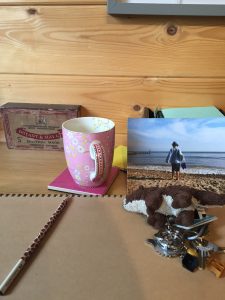In yesterday’s post I talked about how to decide on a subject matter and a way of communicating that subject matter by answering two simple questions – what do you want to write and what do you want to write about? – and getting as specific as possible with your answers. Today I’m going to give you some starting points that you can use if you’re still not sure how to approach your subject matter.
By the way, if you like this idea, do ten more of each tomorrow. In fact, repeating this activity every day for a week is almost guaranteed to generate lots of ideas for writing.
Get your FREE book of writing prompts here.
I had a go at this just now (because I wouldn’t ask you to do anything I’m not prepared to do myself!) and here are the results.
You really do simply have to write down what you can see. There’s no need to think about it or work it out. For more list games, download the PDF available on this page called ‘Free Resource for Parents and Teachers’. (They’re suitable for grown ups too!)

Go through your own list. If you like Mind Mapping, you could use that to stimulate ideas instead of this next stage, but otherwise, here’s what you do:
Decide how each of these objects could become an idea for your writing project.
I’ll imagine two different approaches. One from a blogger writing about productivity for small businesses and one from a short story writer who wants to generate an idea for an upcoming short story anthology. I’m simply using objects from the lists above.
Hopefully you get the idea! If not, post your object / thing in the comments and what you’re writing / writing about and I’ll suggest an idea.
If you’re finding it hard to come up with ideas based on the objects / things on your list, try drilling down a little more with the next exercise called ‘the five associations’. This is essentially a brainstorm so jot down anything that comes to mind. Take random items on your list and do the following. (It isn’t necessary to go through all of these stages with each word. In fact that would probably drive you crazy.)
By the way, if you’re a poet I suggest only doing stages one and two – you’ll have enough material to work with after that!
Get a voucher code for my course on writing poetry here.
Have you ever played ‘word association’? If so, you already know how this works. If not, follow the instructions below. Grab your list and let’s get going.
Note that the ‘five associations game’ works whatever you are writing. You could end up with a political news piece on the conditions workers face in pencil factories (I made this up – I have no idea what the conditions are like in pencil factories) or you could end up with a novel for children about a girl who wishes she could fly or an article for key stage 4 science teachers on the best way to teach students about atmospheric compounds or a blog post about ‘blue sky thinking’.
There’s more on generating ideas here.
I’d be interested to know how you got on with these idea generation exercises. Let me know in the comments. Tomorrow is for bloggers and nonfiction writers: I’ll talk about how you can use templates and subheadings to get the job done more quickly.
Don’t forget to pick up your FREE book of writing prompts here.
Until then, happy writing!